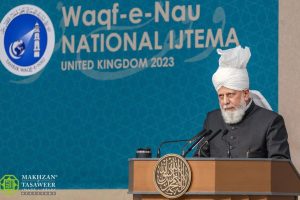
Qasim Choudhary, USA
When we observe someone who is committed to a cause or displays unparalleled devotion to achieve an objective, we admire them knowing that they endured difficulty and made great sacrifices along the way. For instance, when we drive by a stranger jogging at the crack of dawn or running in frigid temperatures, many of us feel respect and admiration for such dedication. Perhaps we say to ourselves, ‘I could never do that’ or ‘I wish I was that disciplined.’ Regardless, we understand that sacrifice is a necessity for success. We would be hard-pressed to find a single example of a person who achieved greatness without sacrifice. Only once we offer sacrifices can we attain any major success and reverence. This holds true both in the worldly and spiritual domains.
In the worldly domain we can consider Michael Phelps. As a child, he was diagnosed with ADHD and told by his teacher that he’d never be successful. Contrary to his teacher’s pronouncement, this young boy overcame his disorder and would go on to become arguably the greatest swimmer of all time and the most decorated Olympian ever, holding a total of 28 medals and a record 8 gold medals at the 2008 Olympic games.
But what was his secret ingredient for success? As his coach and long-time mentor Bob Bowman puts it, ‘We do things other people can’t do or won’t do.’ In other words, Phelps was willing to make the right sacrifices that would eventually propel him to stardom. To sustain his two-hour morning swimming sessions and afternoon resistance training, Phelps was consuming anywhere from eight to ten thousand calories per day. To put this into perspective, the NHS recommends a daily calories intake of two thousand for women and twenty-five hundred for men. It comes as no surprise that aspiring and professional athletes offer immense sacrifices to become the best in the world. They embody the idea of sacrificing the fleeting pleasures of now for the more substantial gains of the future.
But not all sacrifices are of equal standing. There exists a category of sacrifice that goes beyond any material sacrifice one can make: to sacrifice for the ultimate truth. That sacrifice in other words is to chase and strive for the nearness and love of God Almighty. But why would one even pursue such a goal? What are the benefits and rewards?
The Second Caliph of the Ahmadiyya Muslim Community, Hazrat Mirza Bashiruddin Mahmud Ahmad (ra), helps us understand this query by declaring the following, ‘The sacrifice that is done for God’s sake is never wasted, rather, one is granted permanence through it. Therefore it is incumbent upon every being to sacrifice themselves in the way of God to attain eternal life.’
Similarly, the Promised Messiah (as) on one occasion stated, ‘Abraham, peace be upon him, was even ready to slaughter his son to fulfil the commandment of God Almighty. This was a hidden indication of the fact that man ought to become wholly devoted to God; and one’s own life, and the blood of one’s children, and one’s kith and kin, ought to appear insignificant in the face of God’s command.’
Materialistic pursuits may garner some fame and accolades in this world but they cannot guarantee perpetual esteem and respect. We observe many worldly idols who at the height of success fall from grace. Disgraced and humiliated they are reduced to a trivial status and forgotten. Whereas those who offer spiritual sacrifices are safeguarded from such degradation and are granted an eternal life.
In this respect, The Second Caliph of the Ahmadiyya Muslim Community, Hazrat Mirza Bashiruddin Mahmud Ahmad (ra) emphasised,
‘True eminence is attained only after acquiring the pleasure of God Almighty. For instance, Prophet Moses (as) was a revered man. But why? Because he attained the pleasure of God Almighty. The chief of humankind, the Prophet Muhammad (sa) whose grandeur was and is unmatched. But why? Because he was granted the highest level of God’s nearness and His pleasure. The single factor that makes the Holy Prophet (sa) distinct and the most esteemed compared to all of humankind is his closeness to God and having acquired His pleasure.’
Both worldly and spiritual pursuits require incessant toiling and sacrifices that ultimately leads to prosperity. Both demand their seekers to rise well before the sun and make substantial sacrifices for personal comfort. Both demand we delay gratification and resist temptations. Both demand consistency and perseverance. But only one guarantees honour in this world and the next.
As Eid-ul-Adha fast approaches, perhaps we should reconsider the sacrifices we have been making and for what cause. Perhaps this year we can vow to offer the greater sacrifice and achieve the pleasure of God Almighty. For in this cause we have nothing to lose but everything to gain.
About the Author: Qasim Choudhary is a graduate of the Ahmadiyya Institute of Languages and Theology in Canada, and serves as an Imam of the Ahmadiyya Muslim Community in the United States of America.




Add Comment